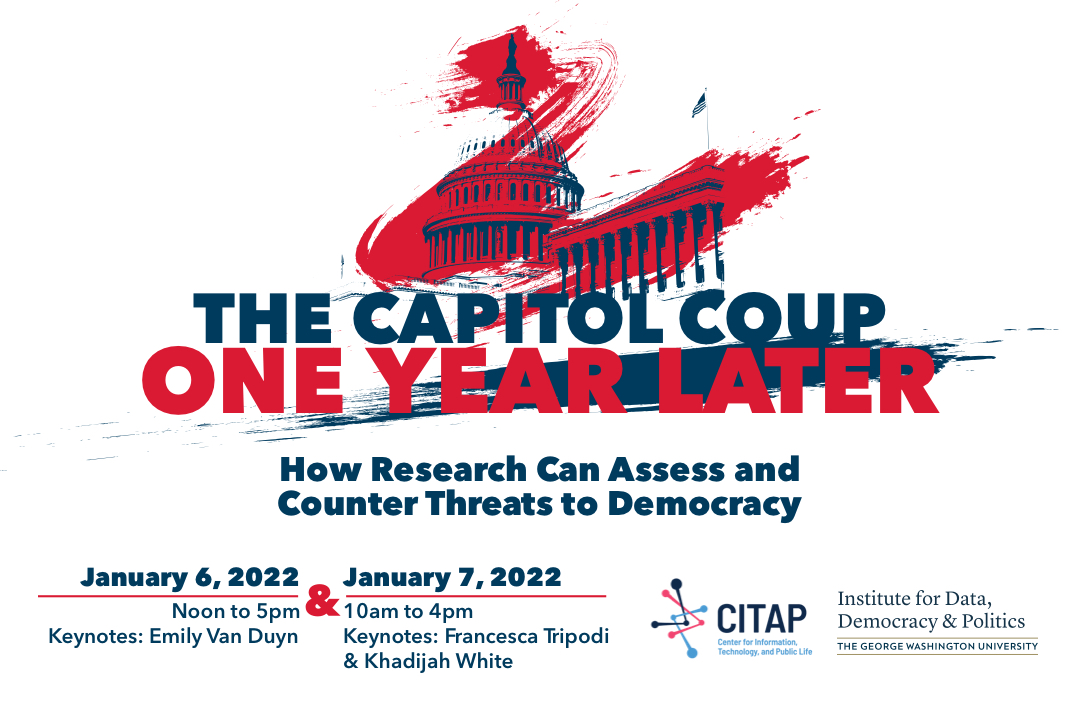The Capitol Coup One Year Later
How Research Can Assess and Counter Threats to Democracy
The George Washington University's Institute for Data, Democracy & Politics (IDDP) and The University of North Carolina's Center for Information, Technology, and Public Life (CITAP) invite you to join them for The Capitol Coup One Year Later: How Research Can Assess and Counter Threats to Democracy, a two day conference exploring key questions surrounding January 6, 2021.
January 6 – Hosted at George Washington University
Day One features a keynote talk from Emily Van Duyn on the theme of “How does our research help us understand what happened on January 6?”
Dr. Emily Van Duyn is an assistant professor in the Department of Communication at the University of Illinois, Urbana-Champaign. Before coming to Illinois, Van Duyn earned her PhD in Communication Studies at The University of Texas at Austin and completed a postdoctoral fellowship at Stanford University with the Program on Democracy and the Internet. Her research explores why people talk (or do not talk) about politics and the role of digital media in facilitating a space for community and political discourse.
Her book Democracy Lives in Darkness: How and Why People Keep Their Politics a Secret (Oxford, 2021) focuses on the reasons why individuals do not express their political opinions in public and how they express those opinions and organize in secret. Her work is concerned with the effects of social, geographic, and political polarization and how these phenomena threaten liberal democratic norms.
January 7 – Hosted at UNC-Chapel Hill
Day Two features keynote talks at UNC from Khadijah White and Francesca Tripodi on the theme of “How should researchers respond to January 6? How should our work change in light of these events?“
Dr. Khadijah Costley White is an Associate Professor in the Department of Journalism and Media Studies at Rutgers University in New Brunswick. Her book, The Branding of Right-Wing Activism: The News Media and the Tea Party (Oxford, 2018) examines the rise of the Tea Party in online, print, broadcast, and cable news. She has been a White House intern on the Obama broadcast media team, a National Association of Black Journalists and United Nations fellow, and an assistant producer for Now on PBS (formerly Now with Bill Moyers). Most recently, she was a 2020-2021 Whiting Public Engagement Fellow completing a community media project on lockdown culture in schools. She has contributed to books and published in journals such as Communication, Culture, and Critique, International Journal of Communication, and more.
White’s writing and commentary on topics such as race, social movements, news, and politics has appeared in National Public Radio, The Atlantic, The New York Times and more. She is also an activist and community organizer, deeply invested in the transformative power of grassroots politics. Through this work, she has founded a community non-profit, SOMA Justice, which organizes for racial, social, and economic justice in South Orange and Maplewood, NJ.
Dr. Francesca Tripodi is a sociologist and media scholar whose research examines the relationship between social media, political partisanship, and digital inequality. She is an Assistant Professor at the School of Information and Library Science (SILS) and a Senior Faculty Researcher at the Center for Information Technology and Public Life at UNC-Chapel Hill. She holds a PhD and MA in sociology from the University of Virginia, as well as an MA in communication, culture, and technology from Georgetown University.
In 2019, Tripodi testified before the U.S. Senate Judiciary Committee on her research, explaining how search engines and processes are gamed to maximize exposure and drive ideologically based queries. This research is the basis of her upcoming book with Yale University Press titled The Propagandists’ Playbook. Recently, her research on patterns of gender inequality on Wikipedia, was featured on NPR All Things Considered and she was awarded an NSF Accelerator grant on Media Trust and Authenticity with partners at MIT, Stanford, and University of Washington.
Her research has been covered by The Washington Post, The New York Times, The New Yorker, NPR, The Columbia Journalism Review, Wired, Slate, The Guardian and The Neiman Journalism Lab.

